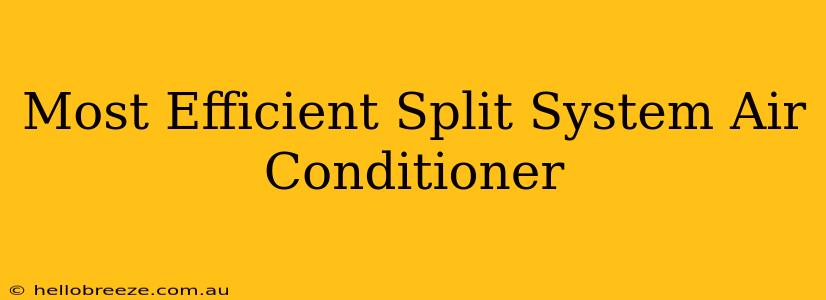Choosing the right air conditioner can significantly impact your comfort and energy bills. Split system air conditioners are a popular choice for their efficiency and flexibility, but navigating the market for the most efficient split system air conditioner can be daunting. This guide will help you understand the factors influencing efficiency and point you towards making an informed decision.
Understanding SEER Ratings: The Key to Efficiency
The Seasonal Energy Efficiency Ratio (SEER) is the most important metric when assessing the efficiency of a split system air conditioner. A higher SEER rating means the unit uses less energy to produce the same amount of cooling. The higher the SEER rating, the lower your electricity bills will be. While minimum SEER ratings vary by region and regulations, look for units with SEER ratings of 16 or higher for optimal energy savings. Some high-efficiency models boast SEER ratings exceeding 20!
Factors Affecting SEER Rating:
-
Compressor Technology: Inverter technology is a game-changer. Inverter compressors adjust their speed based on cooling demand, resulting in significantly improved efficiency compared to traditional single-speed compressors. Look for models explicitly mentioning DC Inverter technology.
-
Refrigerant Type: Modern, environmentally friendly refrigerants like R-410A and R-32 are generally more efficient than older options.
-
Coil Design and Construction: The design and materials used in the evaporator and condenser coils directly impact heat transfer efficiency. High-quality coils are crucial for maximizing SEER.
-
Airflow Management: Efficient airflow within the unit and throughout your space is vital. Look for models with features that optimize airflow, such as variable-speed fans.
Beyond SEER: Other Efficiency Considerations
While SEER is paramount, several other factors contribute to a split system's overall efficiency:
1. Proper Sizing:
An improperly sized unit—too large or too small—will be less efficient. A unit that's too large will cycle on and off frequently, wasting energy. A unit that's too small will struggle to cool your space effectively, running constantly and consuming more power. Consult with a qualified HVAC professional to determine the appropriate size for your needs.
2. Regular Maintenance:
Regular maintenance, including cleaning or replacing air filters, and inspecting coils, is essential for maintaining peak efficiency. Neglecting maintenance can drastically reduce a unit's efficiency and lifespan. Schedule annual maintenance to keep your system running smoothly.
3. Smart Features:
Some advanced split system air conditioners incorporate smart features such as Wi-Fi connectivity, allowing for remote control and scheduling. These features can help optimize energy usage and reduce unnecessary cooling.
Finding the Right Efficient Split System for You:
To find the most efficient split system air conditioner for your specific needs and budget, consider the following:
- Your Cooling Needs: Determine the square footage you need to cool and the level of cooling required.
- Your Budget: High-efficiency units often come with a higher upfront cost, but the long-term energy savings can offset this.
- Installation Costs: Factor in the cost of professional installation.
- Energy Star Certification: Look for the Energy Star label, indicating that the unit meets strict energy efficiency guidelines.
By carefully considering these factors and focusing on SEER ratings, you can select the most efficient split system air conditioner to keep your home cool and your energy bills low. Remember to consult with a qualified HVAC professional for personalized advice and professional installation.

